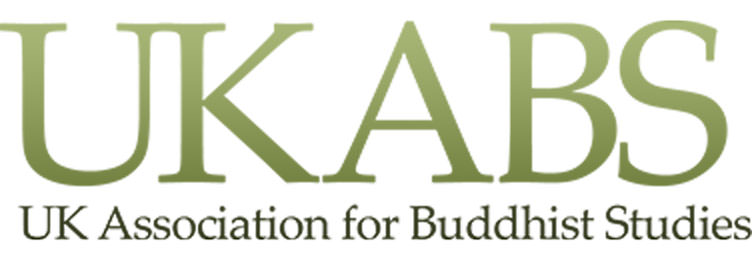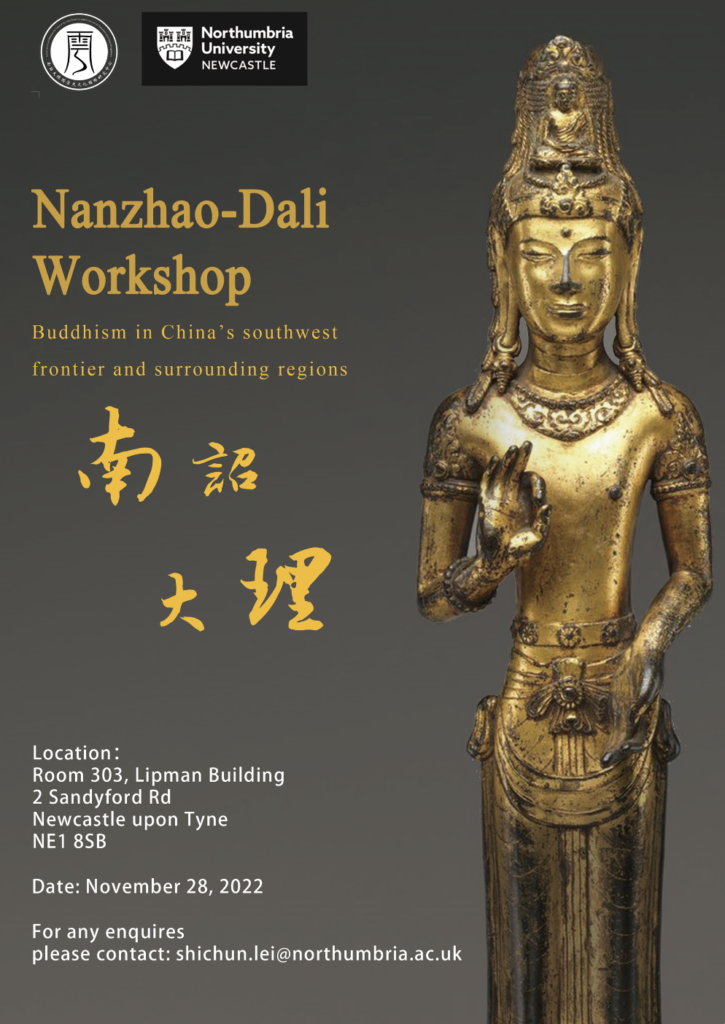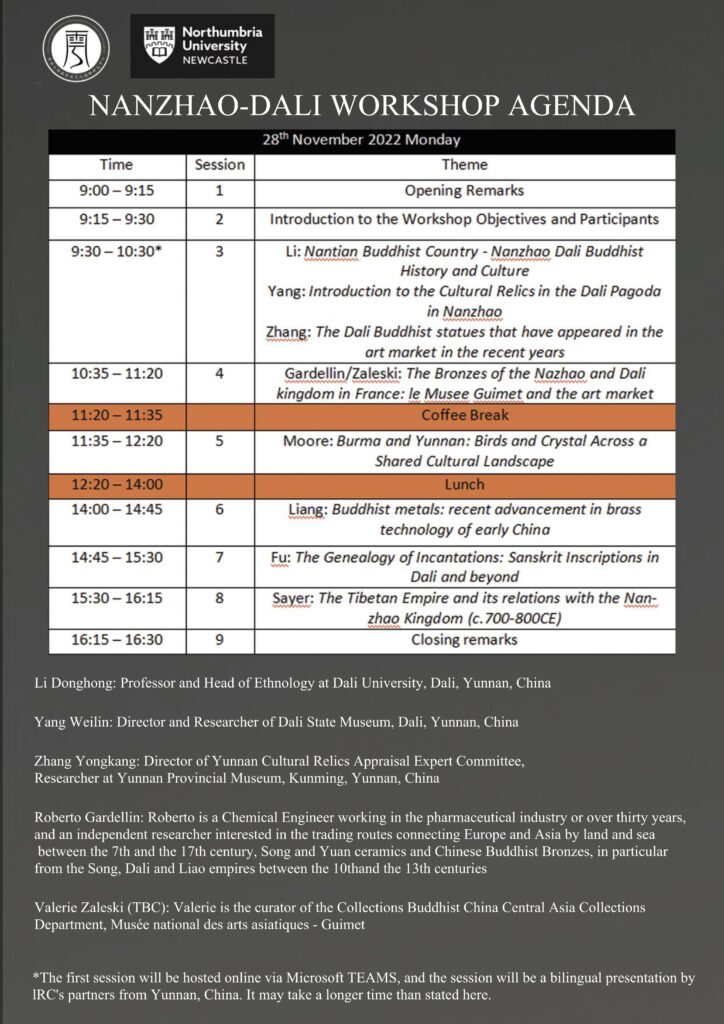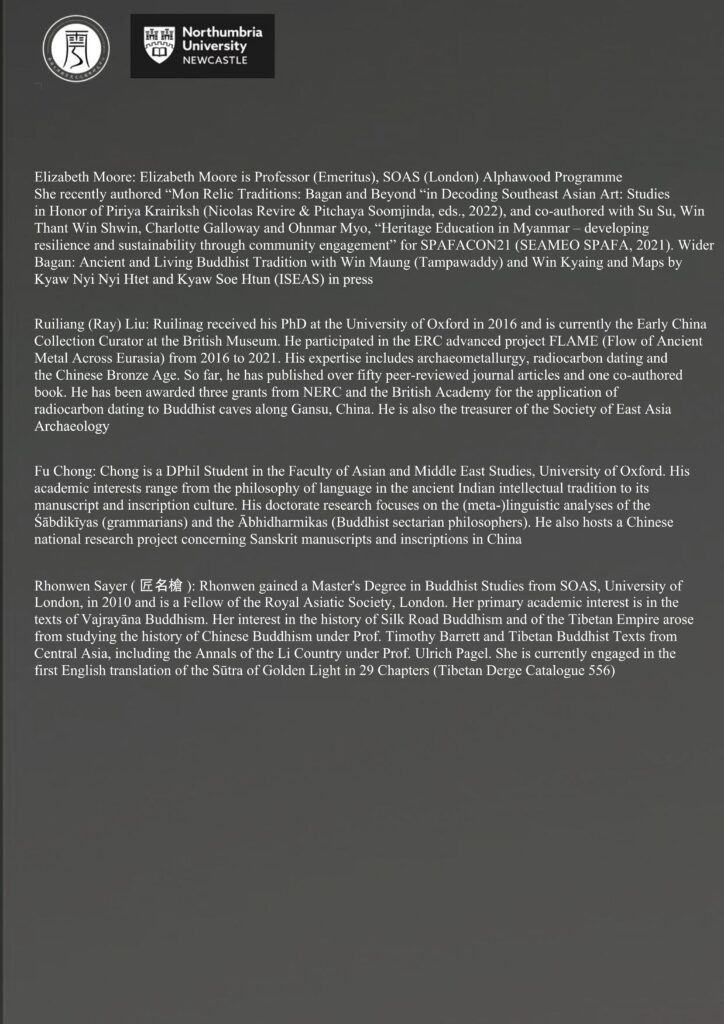OVERVIEW
15 May 2023 at 5:00-6:00pm
Laurence Cox and Brian Bocking
Researching colonial Buddhist history from below – Irish-Burmese monk U Dhammaloka, subaltern perspectives and plebeian movements
22 May 2023 at 7:00-8:30pm
Ajahn Brahmali, Venerable Canda and Guest Bhikkhuni (Registration required)
Two Buddhist Nuns & a Monk Discuss the Buddha’s Views on Women & Gender
24 May 2023 at 9:00-10:30am
Ajahn Brahmali (Registration required)
A monastic approach to translating Buddhist texts
5 June 2023 at 2:00-3:30pm
The Yin-Cheng Distinguished Lecture by Harold Roth (In person and online)
A Zen Foundation for Critical Subjectivity in the New Field of Contemplative Studies
26 June 2023 at 5:00-6:00pm
Wang Song
A debate on infinity paradox in Chinese Buddhist tradition
(無窮過:中國佛教探討的一個哲學問題)
5, 12, 19 May and 2, 16 June at 2.30-4:00pm
Pali Texts Reading (via Teams. Registration required)
University of Oxford
Glorisun Lecture Series in Buddhist Studies 2022-2023
Basement Teaching Room 1 at 5:00pm
Faculty of Asian and Middle Eastern Studies
Pusey Lane
Oxford, OX1 2LE
All Welcome
Tea and snacks at 4:15 – 4:45pm (Common Room in the basement)
All enquiries: [email protected]
15 May 2023
Laurence Cox and Brian Bocking
Researching colonial Buddhist history from below – Irish-Burmese monk U Dhammaloka, subaltern perspectives and plebeian movements
The problem is not always whether the subaltern can speak: it is whether anyone will record and archive it when they do. Moreover, when working-class radicals seek to avoid repression, this can be entertaining for historians but also a problem for their research. With Alicia Turner and the help of an extensive international network of researchers, Laurence Cox and Brian Bocking spent a decade researching the Irish emigrant, sailor, hobo, Buddhist monk and anti-colonial activist U Dhammaloka (1856 – 1913?) – a man with at least five aliases, a 25-year gap in his biography, the target of police and government surveillance and a proto-extradition attempt, someone who faked his own death and eventually disappeared. The lecture discusses some of the challenges of ‘history from below’ in relation to working-class voices, radical social movements, and subaltern ethnicities. It also notes the specific interests of religious organisations and academic disciplines in constructing suitably respectable origin myths to fit contemporary needs.
Laurence Cox is Professor of Sociology at the National University of Ireland Maynooth and has published widely on Buddhist Studies and social movements. A particular area of interest has been uncovering the history of Irish involvement in late C19th and early C20th Buddhist Revival activities in Asia and Europe, including the first Buddhist mission to Europe (1889-1892). With Alicia Turner and Brian Bocking, he recently published The Irish Buddhist: the Forgotten Monk who Faced Down the British Empire (OUP 2020), using the life of Dhammaloka as a lens to explore Asian Buddhist networks.
Brian Bocking (MA Lancaster, PhD Leeds) is emeritus Professor of the Study of Religions at University College Cork, Ireland (retired 2015), previously holding posts at the universities of Stirling, Tsukuba (Japan), Bath Spa and SOAS, London. He has worked on Japanese religions, Buddhism, and the Study of Religions. His books include Nagarjuna in China, with the first full English translation of the 5th-century Chinese text of Nagarjuna’s ‘Middle Treatise’ (1995); A Popular Dictionary of Shinto (1996); and The Oracles of the Three Shrines: Windows on Japanese Religion, a study of the changing form and interpretations over four centuries of a key Japanese religious scroll called the sanja takusen
(2000). With Laurence Cox and the late Yoshinaga Shin’ichi he has researched and published on the forgotten Irish Japanologist and pioneer London Buddhist missionary Charles J W Pfoundes (1840-1907) and together with Alicia Turner and Laurence Cox has co-authored The Irish Buddhist: The Forgotten Monk who Faced Down the British Empire (2000) which reconstructs the life (c. 1856-1914) of the Irish Burmese radical monk U Dhammaloka.
26 June 2023
Wang Song
A debate on infinity paradox in Chinese Buddhist tradition
(無窮過:中國佛教探討的一個哲學問題)
The discussion on ‘infinity paradox’ (無窮過) is widely seen in philosophical traditions around the world, such as those in China, India, and Greece. In the field of ontology, it is generally used to derive the first cause. In the debate on specific propositions, it is used as a fallacy proof. For instance, Chinese philosophers like Zhuangzi, Guo Xiang and their Indian counterparts, such as Nagarjuna, Vasubandhu, and others have all explored the problem of ‘infinity paradox’. After Buddhism was introduced to China, Hua-yan Buddhism philosophers such as Zhiyan and Fazang interfused the two major traditions and proposed the theory of ‘endless origins’ (無盡緣起). Zhang Taiyan (章太炎), a modern philosopher, responded to this based on his philosophical position of ‘Tathagata Monism’ (真如一元論) and put forward different views. This lecture will review relevant literature and analyze the dual perspectives of Buddhist philosophy on this issue.
Professor Song WANG received his B.A. and M.A. from Peking University and Ph.D. in East Asian Buddhism from the International College for Postgraduate Buddhist Studies, Tokyo. Prior to teaching at the Department of Philosophy and Religious Studies of Peking University in 2005, he conducted his postdoctoral research as Overseas Researcher of Japan Society for the Promotion of Science (JSPS). His publications include A Study on the Thought of the Huayan School in the Song Dynasty (2008), Japanese Buddhism: From the Beginning till 20th century (2015), and A Critical Annotation and Study on the Huayan Fajie Guanmen (2016), and numerous papers on East Asian Buddhism in Chinese, Japanese and English.
Kindly supported by Glorisun Global Network for Buddhist Studies.
Two Buddhist Nuns & a Monk Discuss the Buddha’s Views on Women & Gender
Debate by Ajahn Brahmali, Venerable Canda and Guest Bhikkhuni
Monday 22 May, 7.00 – 8.30pm
Leonard Wolfson Auditorium,
Linton Rd, Oxford, OX2 6UD
Join Ajahn Brahmali, Venerable Canda and a guest bhikkhuni for this thought-provoking debate, including the seeming paradox between women & gender, and non-self.
Hear from experts in the field as they explore and analyze the historical context and teachings of the Buddha on this important topic. Gain a deeper understanding of the role of women in Buddhism and learn about contemporary perspectives on gender and equality. This event promises to be an enlightening and stimulating discussion. Don’t miss out on the chance to engage in this important dialogue and expand your understanding of this fascinating topic!
About Ajahn Brahmali
Renowned meditation teacher Ajahn Brahmali is visiting England to lead his second meditation retreat & give an exciting series of Dhamma talks!
A close disciple of Ajahn Brahm, Ajahn Brahmali is known for his for joyful teaching style and incredible understanding of the Early Buddhist Texts. His talks bring the Buddha’s teachings to life in ways that we can readily apply, to help us find more happiness and peace in our lives.
Register at anukampaproject.org/events.
*************************
A monastic approach to translating Buddhist texts
By Ajahn Brahmali
Wednesday 24 May, 9.00-10.30am
Old Common Room, Balliol
To register, contact: [email protected]
Ajahn Brahmali, whose well-received translations of the Vinaya are available on sutta-central, discusses with us his approach to translating from Pali. Anyone interested or engaged in translating from Pali is welcome to join us. Please email [email protected] to confirm your attendance.
Kindly supported by Glorisun Global Network for Buddhist Studies.
************************
University of Oxford
Yin-Cheng Distinguished Lecture Series
5 June 2023 at 2:00-3:30pm
Basement Teaching Room 1
Faculty of Asian and Middle Eastern Studies
Pusey Lane
Oxford, OX1 2LE
All Welcome
Tea and snacks at 3:30-4:00pm (Common Room in the basement)
All enquiries: [email protected]
Harold Roth (Professor of religious studies, Brown University)
A Zen Foundation for Critical Subjectivity in the New Field of Contemplative Studies
The new academic field of Contemplative Studies supplements the third-person academic model of the critical study of texts through the contexts of culture and history with an equal emphasis on the critical study of the experiences embodied in these texts via first-person epistemology, supported by scientific research on meditation. At the core of this first-person epistemology is a new approach to critical subjectivity derived from modern Zen Buddhist philosophy and practice. These will be presented and detailed in the lecture.
Harold D. Roth is professor of religious studies and founding director of the Contemplative Studies Initiative at Brown University. He is a specialist in Chinese philosophy and textual analysis, the classical Daoist tradition and a pioneer of the academic field of Contemplative Studies, in which he created the first Bachelor’s degree program at a major research university in North America. He has written and/or edited nine books and more than 50 scholarly articles in these areas including Original Tao (Columbia, 1999), a translation and analysis of the oldest text on breath meditation in China; “Against Cognitive Imperialism,” (Religion East and West, 2008), a critique of conceptual bias in Cognitive Sciences and Religious Studies; The Huainanzi: A Guide to the Theory and Practice of Government in Early Han China (2010) (with 3 other scholars), the 139 BCE Daoist compendium long considered the last great untranslated work of classical Chinese thought; and The Contemplative Foundations of Classical Daoism (2021), a collection of his scholarly articles on this topic. He is also the compiler and editor of Manifesting Zen: Master Dharma Talks from Mt. Baldy, a collection of teishos on the foundational Chan work, the Linjilu (Jp.: Rinzai roku) by Zen Master Kyōzan Jōshū Rōshi (Sasaki: 1907-2014).
Discussant Sarah Shaw
Dr. Sarah Shaw read Greek and English, at Manchester University, where she did a doctorate in English literature. After studying Pali and Sanskrit at Oxford University, she began to conduct research on Pali literature, particularly jātakas, texts concerned with meditation, and modern practice. She is a member of Wolfson College and the Faculty of Oriental Studies, Oxford. She is also a fellow of the Oxford Centre for Buddhist Studies.
Her books include Buddhist Meditation: an Anthology of Texts, Routledge (2006);
Jātaka Stories: Birth Stories of the Bodhisatta (2006); co-authored, with Naomi Appleton, The Ten Great Birth Stories of the Buddha: the Mahānipāta of the Jātakatthavaṇṇanā Silkworm Books, Thailand/University of Washington Press (2015); Mindfulness: Where it Comes From and What it Means, Shambhala (2020) and The Art of Listening: A Guide to the Early Teachings of Buddhism, Shambhala (2021). She has just edited a posthumous book by her teacher, L.S. Cousins, Meditations of the Pali Traditions: Illuminating Buddhist Doctrine, History, and Practice, Shambhala (2022). A frequent visitor to South and Southeast Asia, she lectures and writes on Buddhist subjects.
About the Yin-Cheng Distinguished Lecture Series:
Launched in September, 2021, the Yin-Cheng Distinguished Lecture Series (印證佛學傑出學術系列講座) is a collaborative, multi-university partnership between Peking University, University of Oxford, University of Cambridge, Inalco (Institut national des langues et civilisations orientales), Princeton University, Harvard University, and the University of British Columbia. The Lecture Series is established in honour of Venerable Cheng-yen 證嚴, founder of Tzu Chi, and her mentor Yinshun 印順 (1906–2005), with the goal of promoting topics in Buddhist Studies.
The lecture will be in person and live-streamed via YouTube with simultaneous English and Mandarin channels.
Pali Texts Reading
5, 12, 19 May and 2, 16 June 2.30-4:00pm via Teams
The Pali reading class was set up to read texts that require certain types of technical knowledge (such as traditional grammar, vinaya, Abhidhamma, or material culture) and/or which do not have a published edition or translation, as well as to support those working on an edition or translation or seeking to understand a particular text for their research. It meets online on Fridays (except those Fridays where key members have other commitments).
Please contact [email protected] or [email protected] if you would like to join this group or have a text you would like to read with this group.



